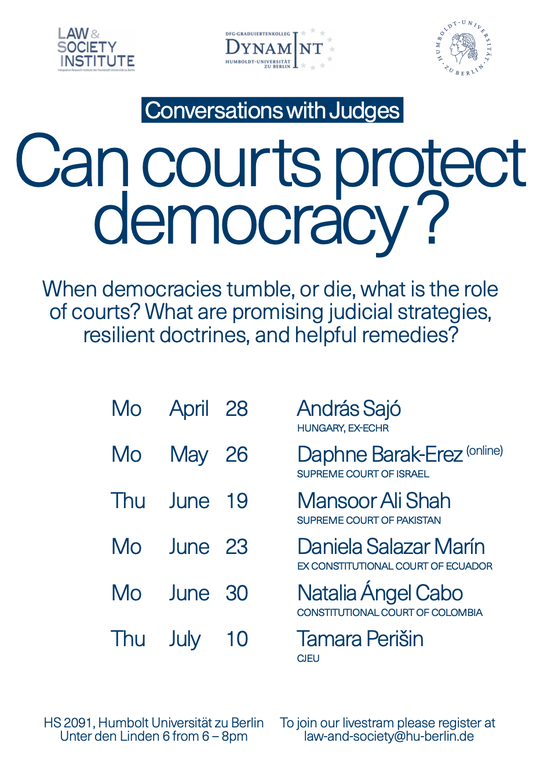Neue Veranstaltungsreihe dieses Sommersemester: "Conversations with Judges: Can Courts protect democracy?"
When democracies tumble, or die, what is the role of courts? What are promising judicial strategies, resilient doctrines, and helpful remedies?

Find out more about these events here here!
In the winter term 2024/25, we started to organize public events on „militant democracy“. A timely issue and thus controversial, and evidently never space and time for all voices simultaneously. This is why a series of public events seemed appropriate, and audience participation our wish. In addition, since LSI attempts to counter traditional academic hierarchies, we invited younger academics to lead conversations with our guests.
This term, we decided to continue the series with judges from around the world. Certainly, what courts can do to defend democracy is but one yet crucial aspect of this broad topic. Inviting judges – instead of lawyers, scholars or activists – comes with opportunities, because it is rare that judges are willing to talk, and that a larger audience has the opportunity to ask questions. But it also comes with limitations, as judges are not free in what they do and talk about. In office and beyond, judges are bound by rules of impartiality and ethical commitments. Generally, a sitting judge must not address any matter that is pending or may come before the court. Some courts also do not allow the presence of a judge at a public event at which such issues are merely mentioned.
Besides, while judges are serving in public office of a state or entity, they are also part of institutions designed as counter-majoritarian actors, and to control these entities. If major political controversies or even atrocities committed by state authorities cannot be addressed, this may be a reason to not invite sitting judges at all.
We decided to do so nonetheless: We do not believe in categorical exclusion based on nationality or other such forms of belonging, as in boycotts. But certainly, this is also no carte blanche. No university or other academic institution should collaborate in “whitewashing” injustice, and thus should not invite speakers who represent a state or institution that systematically violates the law, destroys democracy, wages war or commits crimes against humanity. This is why we did not and would not invite members of a completely “captured” court, or a “court” that is but covering such acts and the absence of the rule of law. Yet based on what we know to date, the ECHR and ECJ, and the courts in Israel, Pakistan, Ecuador or Colombia, members of which accepted our invitation to LSI, are not there. For sure, this is not an endorsement of all the decisions these courts have issued to date. But we still see the option to talk. Still, these supreme, constitutional and human rights courts are designed as counter-majoritarian and thus as anti-autocratic forces, and it seems worth every effort to support that, by inviting people on the bench who are committed to these ideals. Therefore, and as long as this commitment has not vanished, we believe that invitations are an option. But certainly, we continue to discuss how to deal with these situations, and how to take changes into account.
These days, the university is more than ever indispensable as a space for robust debate, when such space is shrinking elsewhere and universities are targeted, to not allow for that. We will continue to work for and in the university – as a brave space that honors the courage to speak up and argue, and as a safe space, not a comfort zone, that offers opportunities to peacefully confront each other, challenge assumptions and convictions, do no harm but seek understanding, and do not stop engaging in conversations. This is not easy, but a lasting task. Context matters, and details do. At LSI, we find ourselves in an ongoing process of critical reflection and negotiations of how to create more discursive spaces, while also enabling a broad range of perspectives to be heard and taken into account. Whoever wants to contribute to that is welcome to join, and we are happy to consider suggestions for future events.

